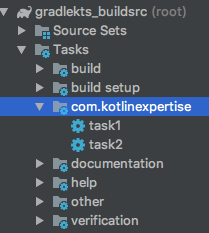Organize Kotlin Scripts as Gradle tasks
In this article, you will learn how you can organize multiple Kotlin scripts as Gradle tasks and make them easily executable this way. I’ve found a discussion about this here. Somebody wanted to execute Kotlin scripts with Gradle build scripts which is, of course, possible by using kotlinc as shown in this (Groovy) build script. This doesn’t look very pretty though, and, as described in the corresponding thread, isn’t very performant and manageable. Another solution would be to use Gradle scripts written with the Kotlin DSL and define custom tasks within a build.gradle.kts file, which obviously can hold and run Kotlin code naturally:
// build.gradle.kts
//
// Execute Kotlin task with: gradle -q foo
task("foo") {
group = "com.kotlinexpertise"
description = "my foo task"
doLast {
println("Hello from foo task")
}
}
The problem with this approach is that, in my case, I had multiple large Kotlin scripts I wanted to make executable this way. If I had put all of them into tasks, the script would have been too bloated and hard to maintain. Note that in my case, these tasks would not contribute to the build logic directly but rather provide business-relevant tasks, which I wanted to make executable via Gradle.
Gradle buildSrc to the rescue
As described in the Gradle documentation, build logic and especially custom tasks shouldn’t live within the build script directly. Gradle, therefore, offers the possibility to use a so-called buildSrc directory. This directory is treated as an included build, i.e. Gradle automatically compiles and tests this code and makes it available on the build script classpath. The following shows a typical project structure using this special buildSrc directory:
├── build.gradle //main build
├── buildSrc
│ ├── build.gradle //build for buildSrc
│ └── src //custom plugins, taks etc.
│ ├── main
│ │ └── java
│ │ └── com
│ │ └── enterprise
│ │ ├── Deploy.java
│ │ └── DeploymentPlugin.java
│ └── test
│ └── java
│ └── com
│ └── enterprise
│ └── DeploymentPluginTest.java
└── settings.gradle
As you can see here, the buildSrc has its own build.gradle, in which we define dependencies and plugins for buildSrc itself. As mentioned, the compiled code will be available for the surrounding build so that you can for instance define custom tasks in the buildSrc and use them in the main build.gradle.
A Kotlin example: Execute Kotlin Scripts with Gradle
Let’s say we have two bigger tasks we want to make available as Gradle tasks, which we call task1 and task2. Both tasks are good fits to be implemented with Kotlin.
The original project build looks like this:
import org.jetbrains.kotlin.gradle.tasks.KotlinCompile
plugins {
kotlin("jvm") version "1.2.51"
}
java.sourceSets {
getByName("main").java.srcDirs("...")
}
repositories {
mavenCentral()
}
dependencies {
compile(kotlin("stdlib-jdk8"))
}
tasks.withType<KotlinCompile> {
kotlinOptions.jvmTarget = "1.8"
}
This is very basic and there’s nothing special in it. Now, the goal is to define two custom tasks taks1 and task2 within this script. Both tasks are supposed to be executable via gradle -q task1|task2. To make this possible, we create the buildSrc directory structure as shown above on the same level the build script already exists. Within the buildSrc, we now create the custom tasks as Kotlin classes:
package com.kotlinexpertise.tasks
import org.gradle.api.DefaultTask
import org.gradle.api.tasks.TaskAction
import java.sql.DriverManager
open class Task1 : DefaultTask() {
init {
group = "com.kotlinexpertise"
description = "task1"
}
@TaskAction
fun run() {
Class.forName("com.mysql.jdbc.Driver")
//heavy task implementation
}
}
Just like we would define a task within a Gradle build script directly, we define group, description and the task itself in a method annotated with TaskAction, which we call run. Learn more about custom tasks here. To make this a bit more interesting, we want to load a MySQL driver in this task, which requires us to make the corresponding dependency available for the buildSrc build. Let’s take a look at its build script (existing directly in buildSrc):
plugins {
`kotlin-dsl`
}
repositories {
mavenCentral()
}
dependencies {
compile("mysql:mysql-connector-java:5.1.24")
}
As mentioned, we add the dependencies we want to use within the buildSrc. Another thing to note is that the org.gradle.kotlin.kotlin-dsl plugin is applied to this build in order to set up the Kotlin compiler features and dependencies to match the ones shipped with Gradle. We used the nicer alias kotlin-dsl in this example.
Now, after defining both Task1 and Task2 as subclasses of DefaultTask, they can be used in the main build.gradle.kts script like this:
import org.jetbrains.kotlin.gradle.tasks.KotlinCompile
import com.kotlinexpertise.tasks.*
//...
task<Task1>("task1")
task<Task1>("task2")
//...
Note that both probably need to be imported as shown here. In the console, gradle tasks will list them, and you can execute them by running gradle -q task1 and gradle -q task2 respectively. You can also see the tasks listed in IntelliJ IDEA:

The source code can be found here: https://github.com/s1monw1/gradle_buildSrc_kotlin
You may want to read another article of mine about the Gradle Kotlin DSL to get more information about the topic. Enjoy.
The post Execute Kotlin Scripts with Gradle appeared first on Kotlin Expertise Blog.

![[Question]Update Local variables from Firebase RealTime Database](https://kotlined.com/wp-content/uploads/2022/02/short-show-270x162.jpg)